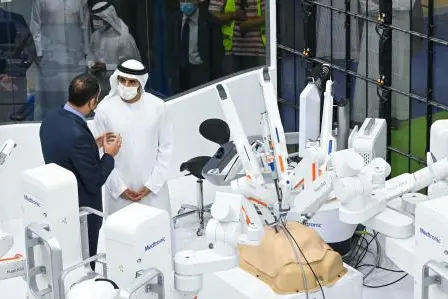PHOTO
Throughout this week’s Arab Health 2022 exhibition, leading healthcare technology company Medtronic is showcasing its newest medtech innovations across several different disease areas, including its new Hugo™ robotic-assisted surgery (RAS) system, Micra™ Pacemaker, PillCam, and InPen™.
Unlocking new possibilities through robotic-assisted surgery
Globally, about 3% of surgeries are performed robotically, despite offering patients the benefits of minimally invasive surgery — fewer complications, shorter hospital stays, and faster return to normal activities, with some findings suggesting that robotic surgery can reduce the length of hospitalization by at a day[1]. In addition, robotic surgery is used by surgeons across a variety of procedures, including heart, abdominal, and bariatric surgeries, which would otherwise require open surgery and larger incisions. Technologies such as the Hugo™ RAS system also help address the historic costs and utilization barriers that have prevented robotic surgery development and adoption for decades. Studies have shown that robotic surgery can allow healthcare providers to better manage increasing costs and deliver the best possible outcomes for patients by reducing complications, operating time, and hospital admissions[2].
“When it comes to the future of healthcare, robotics, miniaturized medical devices and artificial intelligence present infinite potential to advancing patient care, while also helping hospitals improve their operational efficiencies and in the long run reduce costs. For this reason, we are committed to engineering the extraordinary and accelerating care access,” said Majid Kaddoumi, President of Medtronic’s Central & Eastern Europe, Middle East and Africa Region. “The Hugo™ RAS system builds upon our deep history in minimally invasive surgery ushering a new era in surgical robotics, and we’re thrilled to provide in the near future hospitals across the region a robotic-assisted surgery system that is thoughtfully designed to meet their needs today and tomorrow. ”
Overall, the Hugo™ RAS system will offer surgeons advanced visualization, improved ergonomics, and enhanced precision when conducting surgery, while providing flexibility by being mobile from operating room to operating room and compatible with trusted surgical tools. The system also enables surgeons to conduct robotic surgery remotely as well as supporting training from any location.
Changing the future of care through miniaturized medical devices
Through advances in miniaturization, imaging, and battery power, Medtronic is engineering improved outcomes for patients with its technologies such as the Micra™ Pacemaker, the world's smallest pacemaker, and the PillCam, a capsule endoscopy system that uses a camera the size of a multi-vitamin to take thousands of pictures as it travels down the digestive tract in search of abnormalities. Advancements in miniaturization technology can reduce procedural time, length of hospital stays, and the risk of infection for patients.
“At Medtronic we are always engineering breakthrough technologies that unlock new healthcare possibilities and transform lives by alleviating pain, restoring health and extending life for millions of people,” said Khalil Jamaleddine, Regional Vice President for the Arabian Peninsula at Medtronic. “Technology is evolving so quickly that it requires healthcare companies to stay focused on what matters most. For us, this means improving the outcomes of the people we serve here in the region. By developing devices that are smaller, last longer, and have advanced imaging capabilities, we can help expand what’s possible.”
Improving daily lives through Artificial Intelligence (AI)
AI is becoming an integral part of healthcare because of advances in computing and sensing technologies, the expansion of available data, and the creation of better algorithms. AI already plays a pivotal role in the company's robotic-assisted surgery platforms, colonoscopy and endoscopy systems, and insulin pumps, and recently Medtronic has also launched InPen™, the only FDA cleared “smart” insulin pen that integrates glucose sensor data, putting the power of AI to work for patients with Type 1 diabetes who rely on multiple daily injections.
[1] https://www.ncbi.nlm.nih.gov/pmc/articles/PMC6734326/
[2] https://sit.bmj.com/content/3/1/e000042
© Press Release 2022
Disclaimer: The contents of this press release was provided from an external third party provider. This website is not responsible for, and does not control, such external content. This content is provided on an “as is” and “as available” basis and has not been edited in any way. Neither this website nor our affiliates guarantee the accuracy of or endorse the views or opinions expressed in this press release.
The press release is provided for informational purposes only. The content does not provide tax, legal or investment advice or opinion regarding the suitability, value or profitability of any particular security, portfolio or investment strategy. Neither this website nor our affiliates shall be liable for any errors or inaccuracies in the content, or for any actions taken by you in reliance thereon. You expressly agree that your use of the information within this article is at your sole risk.
To the fullest extent permitted by applicable law, this website, its parent company, its subsidiaries, its affiliates and the respective shareholders, directors, officers, employees, agents, advertisers, content providers and licensors will not be liable (jointly or severally) to you for any direct, indirect, consequential, special, incidental, punitive or exemplary damages, including without limitation, lost profits, lost savings and lost revenues, whether in negligence, tort, contract or any other theory of liability, even if the parties have been advised of the possibility or could have foreseen any such damages.




















